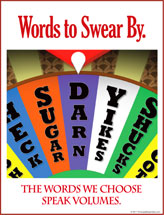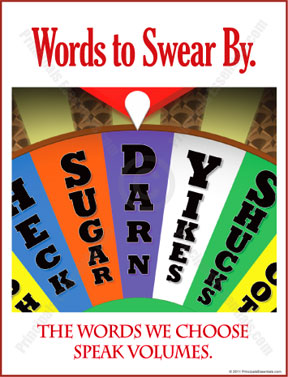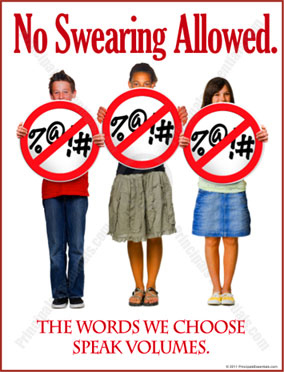8 Great Reasons to Read
The words we speak have the power to open many doors of opportunity. From college applications to job interviews, we are often judged by the way we speak and write.
This poster campaign is designed to challenge your students to strengthen their vocabulary by reading and writing. The key to building a more impressive vocabulary is getting started.
1. Reading is “Brain Food”
Our brains develop as we “feed” them with experiences. The experience of reading (whether you’re the reader or the one being read to) activates and “exercises” many of the areas of the brain. The visual cortex works as your eyes track the words on the page and look at the illustrations. Your memory makes connections between what you already know about the topic of the story and its content. You integrate new information learned through reading further strengthening and growing your network of knowledge. Reading provides one of the most enriching and complex brain activities available in life.
2. Reading improves listening skills
What teacher doesn’t want their student to be a good listener? The experience of being read to helps students develop good listening skills by keying them into the components of language. Through reading they learn to recognize phonemes (the sound building blocks of language), learn new words to add to their oral vocabularies and connect written words to their real world applications.
3. Reading builds early literacy skills
Before a student can read independently they must have phonemic awareness and a basic understanding of phonics. Phonemic awareness or the understanding that words are made up of distinct sounds that affect their meaning is the precursor to reading. Reading aloud to your students is one of the main ways to help him develop phonemic awareness. Beyond this, in order to read, a person must understand that there is a connection between letters and sounds. Without this knowledge letters are just squiggles on a page! When you read with your child she learns that print is a representation of the words you say aloud. Repeated experiences with reading allow this understanding to grow. The single greatest factor in a child’s ability to read is early experiences being read aloud to.
4. Reading prepares children for kindergarten
In this day and age children are expected to come into kindergarten with a strong knowledge base. Today’s kindergarteners are expected to enter the classroom on day one with a knowledge of upper and lower case letters of the alphabet, the ability to recognize basic shapes and colors and the ability to count to ten. Reading books tailored towards young students can help them develop these important and necessary skills.
5. Practice makes perfect
Generally, the more time students are exposed to something and the more time you spend practicing it, the better they will become at performing it. This is absolutely true for reading. Research shows that students who have repeatedly been exposed to books from birth generally exhibit strong reading abilities.
6. Reading improves academic performance
There is a strong correlation between a students’s ability to read and her academic performance. Because so much of our schooling relies on our abilities to read, students must have strong reading skills to succeed and thrive in school.
7. Reading just makes more “Cents”
For every year that a person spends reading (either independently or being read aloud to), his/her lifetime earning potential goes up considerably. For a time investment of approximately 87 hours a year (20 minutes a day for 5 days a week), you can increase your student’s ability to support him or herself in the future considerably.
8. Reading improves family relationships
Because we are busy it is difficult to have “quality” one-on-one time with our children without distractions. Building 20 minutes into each day for reading together provides this important bonding time. There is nothing more wonderful than snuggling a young child on your lap while reading a few storybooks aloud. Even if your student is beyond the “snuggling” stage, spending 20 minutes reading independently provides you with quiet, uninterrupted time together engaged in the same activity.
5 Ways to Deal with Student Profanity.
Students need to be reminded that swearing is not acceptable. Most child behavioral specialist agree that talking to a child, not yelling, is the method of choice that needs to be adopted by parents and schools to curb language problems. Other strategies specifically designed to put an end to inappropriate student language are listed below.
1. Establish a Profanity Free Zone
No one can swear or use foul language; not even the parent(s). Swearing free and profanity free zones include foul language coming from media, television, radio, movies. Song lyrics that contain foul swear words are all too common in today's teen music selections.
2. Model Good Language
Adults who swear or use foul language are only reinforcing its use with children. Swearing often becomes a habit. Like most habits, swearing can be broken within 5 to 7 days of non-use. Let students know that the language they are using in school is just "practice" for when they go off to college or the work force. So much is accomplished through behavior modeling by the teachers and staff, and a true, genuine respect for the students as people.
3. Help Your Students to Use Other Words
Some individuals swear or use foul language because they feel they do not know any other words to express their uncomfortable feelings. We need to teach appropriate words to replace bad words. Some basketball coaches teach their players to say "sugar" or "darn" instead of offensive words.
4. Use Incentives
Put your students on a No Swearing Contract. Consistency is the key. Every swearword must be addressed immediately. You must start at the beginning of the year and constantly remind the students and praise them when they use kind words. Build in incentives but keep the contract simple. Some schools charge a $1 when the student swears.
5. Be Patient
If a student has been using curse words or other inappropriate language, it may take some time for him or her to break the habit. Continue to remind your students of your expectations. It doesn't take long for students to realize that part of the mutual respect is the lack of swearing. If profanity is blatant and direct, ask for an apology. Nine times out of ten, students will eventually catch themselves and self-correct.






























